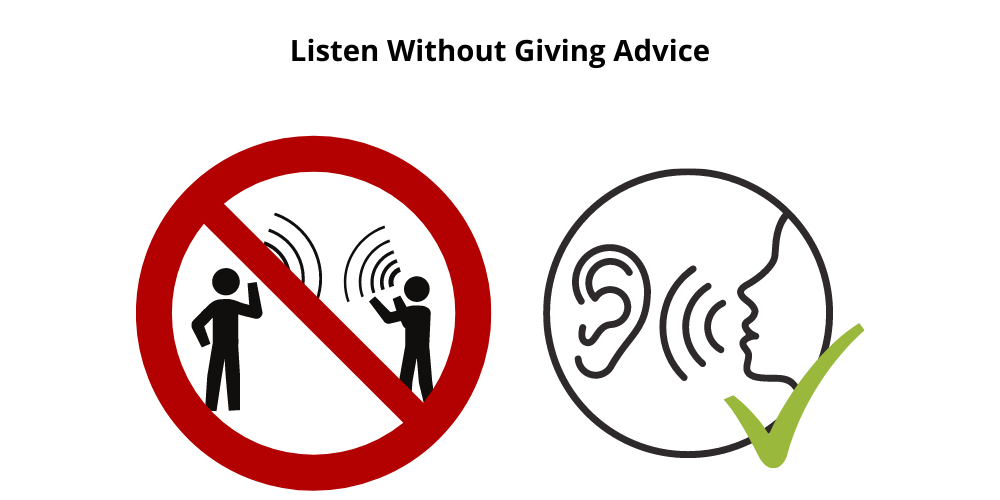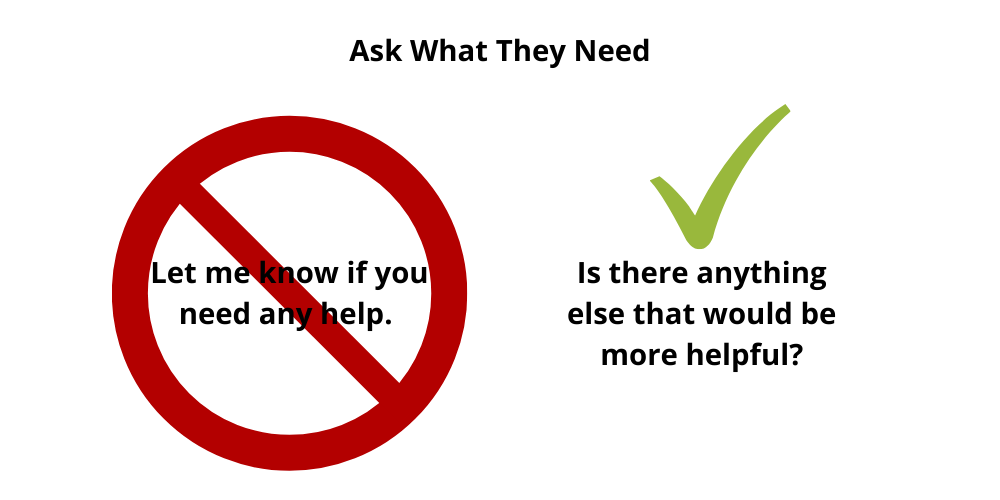Having been a caregiver and listening to other caregiving experiences, I often see friends and family with the best intentions try to help caregivers, but they do it in a way that doesn’t actually help a caregiver.
Have you ever said, “Let me know if you need anything”?
I have. It’s the wrong way to approach helping someone.
Let me break down exactly how to approach a caregiver and help them in a way that will positively impact them.
#1 – Listen Without Giving Advice
Most of us grew up with the mentality that you should help others, which usually included advice.
We were told that if we could relate to someone, we should share our own story to build a bond.
Don’t. Full stop.
Don’t interrupt. Don’t give advice. Don’t share your story (more on that later).
Let the caregiver have the space to share the entire time. It’s okay to sit in silence. It’s okay to give them time to process and share more.
If a caregiver is sharing about how busy they are running errands for their mom who has Parkinson’s and how draining it is to watch her slowly get worse, don’t share a story about your own family with Parkinson’s.
Listen to them, fully and attentively. You don’t need to think about what you are going to say next.
You can use your eyes, small verbal cues, and other facial expressions to let them know you are listening.
If someone wants advice, they will ask for it.
If you are ever in doubt, one simple question will help you. You can ask the caregiver “Is this a situation where you want me to only listen or do you want help trying to solve a problem?”
More often than not, they are likely going to say they only want you to listen.
When you are caregiving, you rarely get a conversation that is 100% about you. You are unsure who you can share with, who will let you have the space, how they will respond, whether they will make it awkward, or who has the time to listen.
It’s a real gift to a caregiver to listen without giving advice.

If you are not sure how to start a conversation because you are afraid of asking the “wrong” question, below are a few ideas:
- What’s it been like for you recently?
- What do you wish people understood about what you are experiencing?
- How have you been spending your time recently?
You can continue asking these at any point. Through my six years of caregiving, the answers have changed often, sometimes by the hour.
If you want the opportunity to help a caregiver, avoid common questions like:
- How are you?
- How is (person they are caregiving for)?
- What have you been up to?
These are easy questions to respond to with “fine”, “okay”, and “not much.”
#2 – Don’t Judge
As much as a caregiver will share, you will never know the whole story.
They may forget certain details, paint a rosier picture, or choose not to share certain parts. You may find one of their decisions revolting. You may not agree with them moving their family member into an assisted living place. You may not like that they told a crude joke about death. You may think they should be doing the opposite of everything they are doing.
It’s okay for you to feel that way.
It’s not okay for you to vocalize it. You don’t know what they have been through, and you don’t have to live with the consequences of their actions.
When caregiving, you can go through and see truly awful things. Sickness. Death. Broken limbs. Not making it to the bathroom. Confusion. Wandering. Poor judgment. Trouble paying the bills. Anxiety. Depression. Hallucinations. Personality changes. A life that’s completely changed.
A caregiver is doing the best they can given what life has thrown at them. They constantly need to make difficult decisions. They likely are already second guessing nearly every one of them.
If they want your opinion, judgment, or advice, they can ask you.
Otherwise, if you hear something you do not agree with, remember it’s not your life. Your judgment won’t help them.
#3 – Refrain From Telling Your Own Stories
I know you want to share and try to relate to the caregiver’s story, but now is not the time.
Even if you went through the exact same situation, it does not mean you need to share. Remember, listening is what is important.
If you had a loved one who went into a nursing home and loved it, wonderful. Their loved one may hate it.
If you had a loved one who was neglected and abused in a memory care facility, that’s awful. Their loved one may have a great experience.
If you had a loved one who benefited greatly from an in-home caregiver, that’s great. That may not be feasible or a good option for their loved one.
You don’t need to scare them with your horror stories or give them hope with your success stories.
Although there are commonalities, each caregiving situation is unique. Each loved one needs something different. Each region has a different care facilities with varying costs. Medical care accessibility is different across the United States.
If there is a nugget of wisdom you want to share, ask permission after they are done fully telling their own story. You can say something along the lines of, “I went through a situation with my loved one, and I thought of something that might help you. I’d like to share, but I also recognize you may only need a listening partner right now. Would you like to hear it?”
If the caregiver wants to hear, now they have the choice.
Empathy and listening are true gifts. Your stories usually are not.
#4 – Ask What They Need
If you’ve ever been in a difficult situation, you know people will often say, “Let me know if you need anything.”
Remember how unhelpful that offer was?
It’s unhelpful for a caregiver, too.
People mean well when they offer, but most of the time, no caregiver is going to call you and say exactly what they need.
They are not sure how much time you have, don’t want to inconvenience you, and our society has instilled in people that asking for help is a bad idea, even though it’s not.
The best way I’ve seen someone help is by being specific in their offer (more in the next section) and then asking what would be more helpful.
For example, you could say, “I’d like to bring takeout from XYZ restaurant over on Friday at 6 p.m. Is there anything else that would be more helpful?”

Another idea is to say, “I was thinking of how nice a clean house can feel and thought you might enjoy a clean house, too. Would it be okay if I came over on Saturday at 1 p.m. to clean your house? I’m also happy to run other errands or do something on a different day. What do you feel you need at this moment?”
I suggest making the offer equal in difficulty or time to something else you might want to do.
For instance, if you only have one hour, say, “I could help you for an hour by going to the grocery store and picking up food for the week. Is there anything else that would be more helpful in an hour?” This way you don’t offer grocery shopping and then the ask is an entire day of help.
If you would be willing to watch the person they are caregiving for during the day, offer up an entire afternoon and evening. That will show the caregiver how serious you are about helping and the time you are willing to put into helping. Then, if they decide that’s not what they need help with now, they can offer another suggestion about how to help that will take a similar amount of time.
Instead of a blanket offer of “let me know if you need anything”, try asking what they need after offering something.
#5 – Be Specific in Your Offer to Help
The reason you need to be specific in your offer to help is that it can be awkward to ask for help.
How often do you feel comfortable asking someone for help?
If you are like most people, it can feel difficult.
The caregiver may need help with something, but they have no idea how long it will take or when they can do it. They may feel like they are imposing on you. They may not know what you are comfortable doing, such as handling medications, driving a loved one to appointments, or watching children.
By being specific in your offer, you are signaling to the caregiver what you are capable of and how much time you have to give. Then, it’s easier for them to pick something else that might be more helpful at the moment, but still fits within your time and capability constraints.
A bonus of you being specific in your offer to help a caregiver is that you may think of something they have not thought of or something that is “nice, but not critical.” For example, you might suggest going to the spa or movies together. That may not be in their top 10 of things that need to be done now (heck, it might not be in their top 100!), but it might motivate them to figure out respite care to take the time to go with you and come back a little more re-energized.
Sometimes the things we need most, we are the worst at giving ourselves.
Don’t forget to always follow up your specific offer to help with the question, “Is there anything else that you feel would be more helpful right now?” It can open the door to productive conversations.
#6 – Invite Them to An Activity
Caregiving is draining.
A caregiver’s world often becomes smaller and smaller. Sometimes, friends stop inviting them out or are afraid of asking them to come on a trip because they don’t think they will be able to come.
Please keep asking them, but be mindful that they may say no most of the time.
It’s okay to keep asking. It can be tough to create the time to go out with friends while caregiving, particularly if they are trying to manage work, too. After everything gets done, sometimes the thought of going out to do something is too exhausting.
If you keep inviting them, you may ask at a good time where they have the time and energy to go with you.
You don’t need to invite them to something extra special. It could be a workout or yoga class, a walk around the neighborhood, or going out to eat.
Although they may want to stay in, sometimes going out is exactly what someone needs. There have been many times when I was tempted to stay in, but I was refreshed and re-energized after going out.
You know your friend or family member and what type of activity they may want to be a part of. Create opportunities to invite them to those activities.
It can feel isolating caregiving, which means invitations to an activity or get-together can be really helpful.
#7 – Get a Gift or Food
Most of the other ways you can help don’t cost anything or come with a small cost, but if you are willing to spend some money, getting them a gift or food can help.
The gift can be small, such as a handwritten note acknowledging their work as a caregiver and that you notice how much time and effort it takes. I know a note may seem small, but the acknowledgment that they are sacrificing can go a long way. Caregivers are often underappreciated.
If you are unsure what someone might want, a gift card to a restaurant or meal delivery service is a great option. Many caregivers can’t find the time to cook seven days a week while juggling everything else. Getting delivery or picking up takeout can be a special treat while saving them time.
If you want to cook something for them, go for it. Something to be mindful of is that other people may have the same idea. If you know many other people are bringing over the common casserole, maybe go a different direction. There are only so many casseroles a caregiver can eat or freeze.
Other options could include a gift card to a massage or elder care consultant, hiring a house cleaner, or sending them a book you’ve enjoyed. Or, search online for gifts for caregivers to see what catches your eyes.
Most gifts that can “buy back time” are helpful for caregivers because they are often short on time and energy.
If you don’t want to spend money, remember, a note every once in a while is meaningful. Caregivers often don’t feel seen. A note can make them feel seen.
Gifts or food are great ways to help a caregiver.
Final Thoughts – My Question for You
Truly helping a caregiver is more than “let me know how I can help.”
It takes a concerted effort to help a caregiver. The first step is listening without giving advice and reserving judgment.
Caregiving can be rewarding, but it can feel awful and hopeless at the same time.
You don’t need to tell your own stories to relate to a caregiver. If you listen regularly, a caregiver is going to feel like you are relating. They may even ask you to share your own story one day. For the time being, give them the space to share with you.
When you are tempted to offer help, be specific in your offer and follow up with “Is there anything else that would be more helpful?” or “How else could I make your life easier?”
It signals to them that you are serious and gives them a better idea of how much you are willing to help.
Don’t forget to regularly invite the caregiver to an activity or event. Even though they may turn you down 9 times out of 10, that tenth time may mean the world to them.
Finally, a handwritten note acknowledging their caregiving could go a long way. If you are feeling more generous, a gift that helps them buy back some of their time could also be really helpful.
I’ll leave you with one question to act on.
How are you going to help the caregivers in your life?





